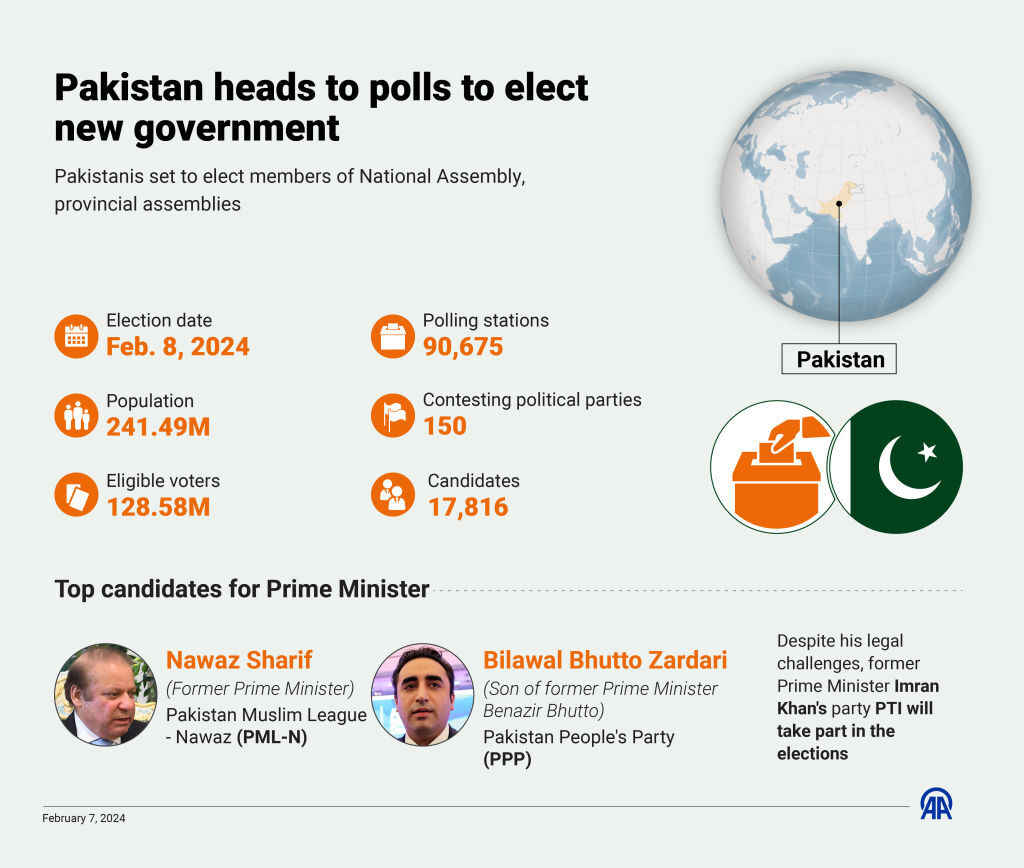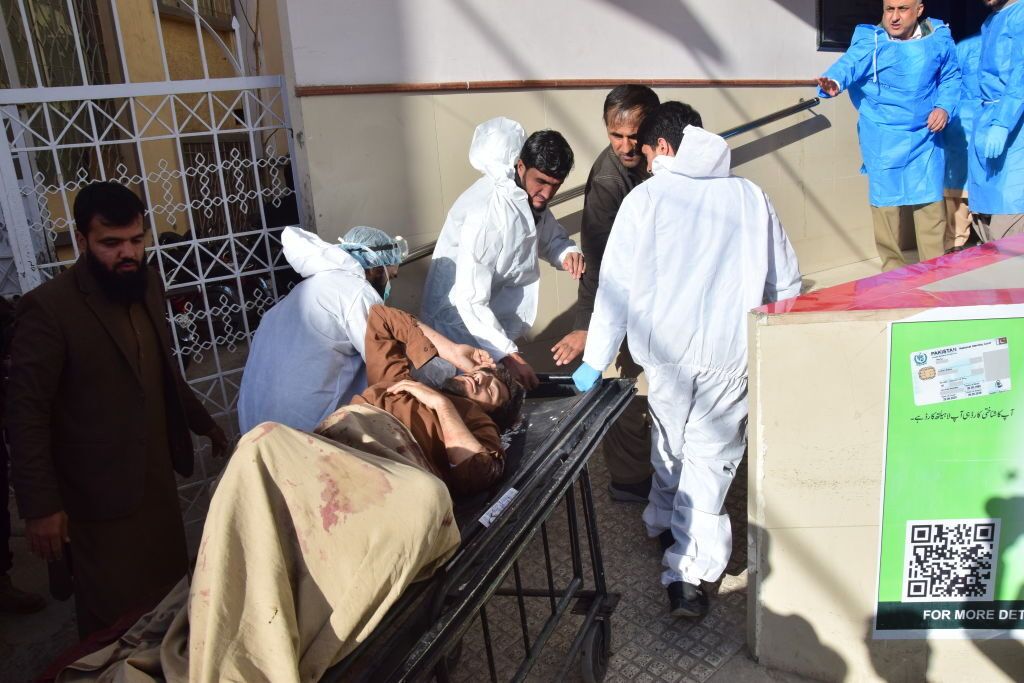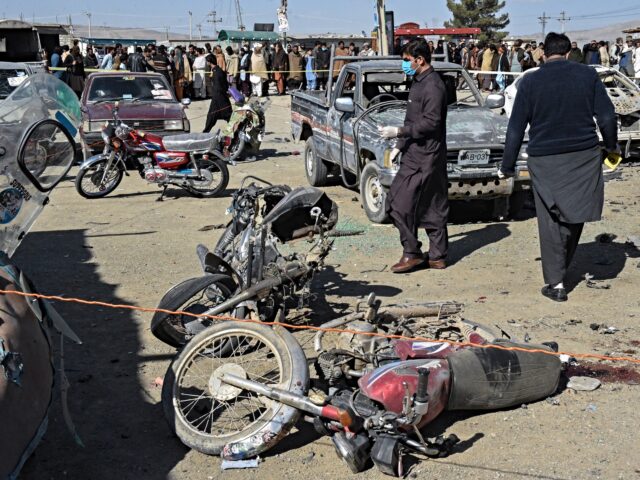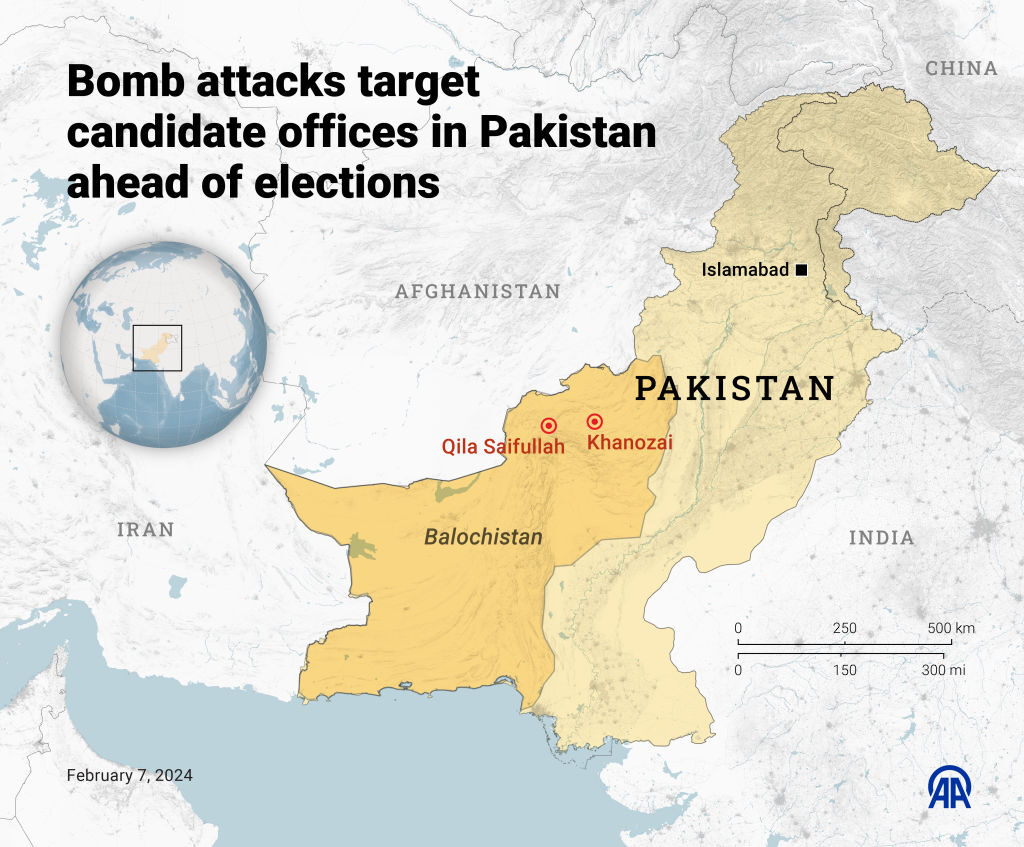Two bombings targeting a political party headquarters and a local government office killed at least 28 people in Balochistan, Pakistan, on Wednesday – the day before a massive nationwide election preceded by outsized political violence and what some have branded state persecution of opposition parties.
The deadly explosions on Wednesday, which local outlets have not attributed to any individual or terrorist organization in particular at press time, followed a string of at least nine bombings on Tuesday in which terrorists on motorcycles hurled grenades at polling stations.
Pakistani officials have vowed to hold the elections on Thursday despite the wave of violence and accusations of suppression of the Islamist Pakistan Tehreek-e-Insaf (PTI) party, whose leader, former Pakistani Prime Minister Imran Khan, was sentenced to 24 years in prison in two separate sentencings the week before the election. Khan, a radical Islamist who polling indicates is the most popular politician in the country, lost the prime ministership via a vote of no confidence in April 2022.
Multiple attempts to imprison him failed as Islamist mobs surrounded Khan’s home, preventing police from accessing it, until a final attempt succeeded in August. Khan has since been campaigning for PTI candidates using, among other strategies, artificial intelligence to create realistic videos of his AI self reading speeches written in prison.
Pakistan’s major news outlets did not indicate if the situation surrounding the PTI and Khan was related to the bombings on Wednesday.
The Pakistani newspaper Dawn reported that the Balochistan bombings appeared to be caused by explosives hidden in a parked motorcycle. One of the bombs hit the offices of a local union council – a municipal government authority – and was placed near the election office of an independent candidate, Jumma Dad Mandokhail.
The second bomb, the newspaper added, appeared to target a local office of the Islamist political party Jamiat Ulema-i-Islam Fazl (JUI-F).
Authorities reported that the first bombing killed 18 people and injured 23, while the second killed ten and injured 20. More deaths are possible in the near future as many of the injured sustained serious injuries.
Local officials described the bombings as an “attempt to sabotage the process of peaceful elections” and urged voters not to be intimidated out of exercising their right to vote. The attacks on Wednesday appeared to be part of a larger campaign against election targets, as Dawn had documented 19 similar incidents in the past week. On Tuesday, the newspaper reported that Balochistan had experienced a wave of “at least nine grenade attacks targeting election offices of candidates and polling stations.” At least one grenade destroyed the windows of a school set up to serve as a voting station.
On February 2, Dawn reported a similar wave of “at least 10 bomb and grenade attacks” in Balochistan, which killed one person, 84-year-old Abdul Khaliq Shah. The newspaper, citing statistics from the Centre for Research and Security Studies, relayed that Pakistan had “witnessed 1,524 violence-related fatalities and 1,463 injuries from 789 terror attacks and counter-terror operations in 2023,” 90 percent of them in either Balochistan or Khyber Pakhtunkhwa.
While the number of incidents skyrocketed in 2023, political violence has been common in Pakistan for years. In 2022, Imran Khan was shot in the leg while delivering a speech at a rally intended to regroup PTI supporters after his ouster. Khan delivered an over hour-long speech in a wheelchair immediately after the assassination attempt in which he accused Shehbaz Sharif, his successor, of plotting his assassination.

The main players as Pakistan head to the polls (Photo by Elmurod Usubaliev/Anadolu via Getty Images)
Pakistani Senator Samina Mumtaz Zehri described the bombings last week as, according to available intelligence, part of “a well-thought-out plan,” but did not offer any information regarding who or what organization may have been behind the alleged plan.
Pakistanis are scheduled to vote on Thursday in elections representing over 800 contested seats, both in the Pakistani Parliament and in local legislatures. The heads of several of the largest political parties will be on the ballot – Imran Khan being the major exception – including the Pakistan People’s Party (PPP) chairman Bilawal Bhutto and former Prime Minister Nawaz Sharif of the establishment Pakistan Muslim League-Nawaz (PML-N).
Nawaz is seeking to succeed his brother, Shehbaz Sharif, who took over after the ouster of Imran Khan, and return to power himself after a corruption scandal resulted in his resignation and a ten-year prison sentence in 2018. Sharif responded to the conviction by fleeing to the United Kingdom and returned shortly before the high court of Islamabad overturned Sharif’s corruption convictions in November.
The controversial return of Nawaz Sharif and the treatment of Imran Khan have invited international scrutiny. A spokesperson for the United Nations High Commissioner for Human Rights, Liz Throssell, issued a statement on Tuesday condemning the persecution of Khan’s supporters.
“We are disturbed by the pattern of harassment, arrests, and prolonged detentions of leaders of the Pakistan Tehreek-e-Insaf (PTI) party and their supporters during the election period,” Throssell said, according to the Pakistan Express Tribune.

Pakistani paramedical team take injured people to the hospital for treatment after two separate attacks killed at least 25 people and dozens of injuries in Quetta, Pakistan on February 07, 2024. (Mazhar Chandio/Anadolu via Getty Images)
Throssel also observed that, “in the lead-up to the vote, there have been no less than 24 reported instances in which armed groups have staged attacks against members of political parties.” The statement was issued before Wednesday’s bombings.
The treatment of PTI supporters has become a prime issue in this election cycle. The Islamabad High Court – the same court that overturned the corruption convictions on Nawaz Sharif – issued an order on Tuesday commanding national police forces to stop harassing PTI candidates and volunteers after PTI leaders accused police of accosting PTI supporters and threatening them with legal action if they voted for the party.
“They are making phone calls and telling PTI candidates that if they hold a rally, they will be booked under a case,” added PTI attorney Shoaib Shaheen denounced.
The government also banned PTI from using its cricket bat logo – Imran Khan was famously a professional cricketer before entering politics – on ballots. The use of logos is pivotal in Pakistani elections, as much of the electorate is illiterate.
Speaking to anonymous young voters on Wednesday, the Express Tribune found that the PTI, despite its radical Islamic ideology and the government’s actions against it, remains popular.
“Two of our friends have decided to quit jobs to vote for PTI because their boss refused to give them leave on polling day,” an unnamed young man in Islamabad told the newspaper, saying that he himself “wouldn’t mind leaving the job if it comes to choosing between vote and job.”
Another man said he would support the PTI as, “in the polling booth, I will be alone with the ballot paper.”


COMMENTS
Please let us know if you're having issues with commenting.